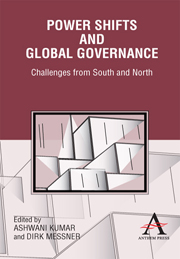Book contents
- Frontmatter
- Contents
- List of Contributors
- Foreword
- Power Shifts and Global Governance
- Part One Theoretical and Analytical Reflections on Global Governance
- Part Two Power Shifts, Regional Experiences and Global Challenges
- 7 Global Power Shifts and South Africa's Southern Agenda: Caught between African Solidarity and Regional Leadership
- 8 Mexico as an Emerging Power in the Present World Scenario: Global Economy without National Development Strategy?
- 9 Trilateral Relations among Africa, China and Europe: A Chinese Perspective
- 10 South America and US Relations: Implications for Regional Security
- 11 The Future Developments in Global Governance – Multilateralism & Regionalization Process: India's Role
- 12 Managing Social Issues for Sustainable Development: The Indian Experiences
- Part Three Case Studies in Global Governance
- Notes
10 - South America and US Relations: Implications for Regional Security
from Part Two - Power Shifts, Regional Experiences and Global Challenges
Published online by Cambridge University Press: 05 March 2012
- Frontmatter
- Contents
- List of Contributors
- Foreword
- Power Shifts and Global Governance
- Part One Theoretical and Analytical Reflections on Global Governance
- Part Two Power Shifts, Regional Experiences and Global Challenges
- 7 Global Power Shifts and South Africa's Southern Agenda: Caught between African Solidarity and Regional Leadership
- 8 Mexico as an Emerging Power in the Present World Scenario: Global Economy without National Development Strategy?
- 9 Trilateral Relations among Africa, China and Europe: A Chinese Perspective
- 10 South America and US Relations: Implications for Regional Security
- 11 The Future Developments in Global Governance – Multilateralism & Regionalization Process: India's Role
- 12 Managing Social Issues for Sustainable Development: The Indian Experiences
- Part Three Case Studies in Global Governance
- Notes
Summary
Introduction: The Securitization of New Threats
Studies regarding international governance rarely dedicate room for reflection about the link between international security and governance. There are three main categories of actors that engage in the international regulation of new types of conflict: international organizations, whose best known mechanisms are UN's peace and humanitarian missions; states, especially medium and great powers, that interact in UN's multilateral forum and regional organizations such as North Atlantic Treaty Organizaion (NATO) or through unilateral or bilateral means; finally, in a third level of action, we cannot ignore the important role played by non-governmental organizations (NGOs) in humanitarian operations around the world.
Security and governance structures not only face traditional forms of military conflicts existing since the Cold War period, but also ‘new wars’. War on terror, war on drugs, war on organized crime, war on hunger – all of these categories of conflicts are part of what Mary Kaldor called ‘new wars’. According to Kaldor, these are: ‘conflicts in which frontiers can not be well defined between war, organized crime and massive violation of human rights’. These wars happen ‘in a context of erosion of State's autonomy and in extreme cases of State's disintegration. Particularly, they occur in the context of the erosion of the legitimate and organized violence’ (Kaldor 1999, 4).
- Type
- Chapter
- Information
- Power Shifts and Global GovernanceChallenges from South and North, pp. 181 - 202Publisher: Anthem PressPrint publication year: 2010



